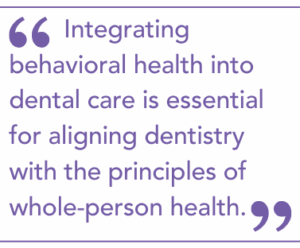By Katie Pudwill, RDH, PhD
August 7, 2025
Don’t miss Dr. Pudwill’s session at ADHA25 in Long Beach, CA on Sunday, October 5 – ED22: Motivational Interviewing and Trauma-Informed Care Workshop.
Oral healthcare providers often encounter patients who appear resistant, disengaged, or overwhelmed. Traditional approaches to patient education and behavior change may fall short when they fail to account for the underlying factors shaping a person’s relationship with healthcare.
Clinicians often find themselves repeating oral hygiene instructions or trying to convince patients to take action, only to be met with resistance. By combining the principles of motivational interviewing and trauma-informed care, providers can transform their approach to patient collaboration.
Adverse Childhood Experiences
Adverse childhood experiences (ACEs) provide clinicians a unique insight into a patient’s background and trauma. In the original ACEs study, researchers categorized these experiences into two main categories: abuse (physical, psychological, and sexual) and household dysfunction (substance use, mental illness, and violence/crime).1 There is a significant dose-dependent relationship between the exposure to these experiences and risk for adult health conditions such as ischemic heart disease, cancers, lung and liver diseases, among others.1 Data also shows that this dose-dependent relationship may have a negative effect on oral health and active caries.2

Science shows that overactivation of the body’s stress mechanisms from exposure to chronic adversity alters the way the body learns to regulate itself.3 For the dental clinician, this means that regardless of a patient’s age, their experiences in the dental operatory may be shaped by a history of trauma, adverse exposures, and maladaptive coping mechanisms that can biologically impair their ability to regulate stress, particularly in dental settings.
While screening for Adverse Childhood Experiences (ACEs) in dental settings may initially appear challenging, gaining insight into the patient’s history and its impact on health behaviors offers clinical value for delivering sensitive and effective care. There are over 14 ACEs assessment tools; however, these tools are often used for research and population surveillance, and there are limited studies to determine their best use for clinical outcomes.4
The National Survey of Children’s Health (NSCH) – ACEs screening tool has been a proven, reliable measure to calculate risk and may be used for risk assessment and as an educational tool to help families and children learn about recognizing and managing stress.4 In a study among nurse practitioners, trauma-informed clinicians can significantly mitigate the mental and physical effects of ACEs by using patient-centered approaches to focus on personal goals and thus improve health.5 Screening for ACEs in the dental clinic can provide the providers with powerful insight into the patient experience.
Motivational Interviewing
Motivational interviewing (MI) is a patient-centered approach to communication that many clinicians utilize to support patient decision-making. The power of MI in regards to handling ACEs is found in the collaboration with the patient, using guiding style questions to empower patients and personalize the desired health outcomes.6 Using appropriate open-ended questions, for example, allows the patient space and time to divulge concerns and encourages patients to evoke their reasons for wanting improved outcomes.7 In families, MI has also been shown to improve parental attitudes towards children’s oral hygiene needs.8 When put in the context of problem-solving, MI supports the provider-patient relationship by building empathy and establishing a shared understanding of why a problem exists versus jumping to solutions that may not be contextually appropriate.9 MI supports awareness and respect for patients of all backgrounds.
Integration of Trauma-Informed Care
Dentistry must continue advancing its integration with behavioral health, ensuring its relevance within patient-centered care to remain responsive to these models. Understanding facets of behavioral health and ACEs may better contextualize avoidance of care, rejection of treatment plans, and distress in the operatory.10 One study showed that decreases in dopaminergic activity can lead to poor emotion-based decision making that reduces the patient’s awareness of long-term consequences.11
Providers need to be aware of the patient’s emotional state and mindset to fully understand the decision-making process and can then empower them to take positive action through the use of MI.

Integrating behavioral health into dental care is essential for aligning dentistry with the principles of whole-person health. Aside from dental goals alone, behavioral health integrations may also help connect patients with behavior and crisis management utilizing a network of federal and locally available tools like 988 Suicide & Crisis Lifeline, federally qualified health centers (FQHC), or Certified Community Behavior Health Clinics (CCBCHs).10
When used on a “macro” level, Macro MI may also be useful in identifying socially engineered trauma as well, including but not limited to poverty, economic exclusion, homelessness, etc.9 Identifying needs outside of dentistry is one more connection dental providers can make to support whole-body wellness.
It is important to point out that the dental provider may play an important role in this themselves. Counter-ACEs, or experiences that have a mitigative effect on trauma, can help build resilience and may include things such as parent-child attachment and household routines.12
Self-regulation, the ability to regulate one’s own emotions, and desensitization, can improve coping with dental anxieties and reduce fear.13 Co-regulation, the ability to help another regulate their emotions, can be utilized by dental providers to respond to patient’s needs, identify emotions and providing strategies to calm down.14 Imagine, a restorative dental encounter with a patient that helps them build resilience through co-regulation and connects them with support systems in their local community.
The integration of motivational interviewing and trauma-informed care within dental settings represents a necessary evolution toward whole-person, behaviorally informed oral healthcare. Utilizing MI and understanding ACEs can establish better communication and guide patients (and families) towards the root of traumatic responses and build a network of resilience around them.
By adopting patient-centered communication strategies rooted in empathy, autonomy, and collaboration, clinicians can transform routine interactions into meaningful opportunities for healing and empowerment. As dentistry continues to align itself with trauma-informed care models, the empowered provider stands at the forefront, reshaping clinical encounters into spaces of trust, safety, and transformation.
____________________________________
References
- Vincent J. Felitti, Robert F. Anda, Dale Nordenberg, David F. Williamson, Alison M. Spitz, Valerie Edwards, and James S. Marks, “Relationship of Childhood Abuse and Household Dysfunction to Many of the Leading Causes of Death in Adults: The Adverse Childhood Experiences (ACE) Study,” American Journal of Preventive Medicine 14, no. 4 (1998): 245-258.
- Melissa A. Bright, Shannon M. Alford, Melanie S. Hinojosa, Caprice Knapp, and Daniel E. Fernandez-Baca, “Adverse Childhood Experiences and Dental Health in Children and Adolescents,” Community Dentistry and Oral Epidemiology 43, no. 3 (2015): 193-199.
- Jack P. Shonkoff, Andrew S. Garner, Committee on Psychosocial Aspects of Child and Family Health, Committee on Early Childhood, Adoption, and Dependent Care, and Section on Developmental and Behavioral Pediatrics, Benjamin S. Siegel, Mary I. Dobbins, Marian F. Earls, Andrew S. Garner, Laura McGuinn, John Pascoe, and David L. Wood, “The Lifelong Effects of Early Childhood Adversity and Toxic Stress,” Pediatrics 129, no. 1 (2012): e232-e246.
- Christina D. Bethell, Adam Carle, Jeffrey Hudziak, Narangerel Gombojav, Kristi Powers, Rebecca Wade, and Paula Braveman, “Methods to Assess Adverse Childhood Experiences of Children and Families: Toward Approaches to Promote Child Well-Being in Policy and Practice,” Academic Pediatrics 17, no. 7 (2017): S51–S69.
- Jana L. Esden, “Adverse Childhood Experiences and Implementing Trauma-Informed Primary Care,” The Nurse Practitioner 43, no. 12 (2018): 10-21.
- William R. Miller and Stephen Rollnick, Motivational Interviewing: Helping People Change (New York: Guilford Press, 2012).
- Stephen Rollnick, William R. Miller, Christopher C. Butler, and Mark S. Aloia, Motivational Interviewing in Health Care: Helping Patients Change Behavior (New York: Guilford Press, 2008).
- P. Arrow, J. Raheb, and R. McInnes, “Motivational Interviewing and Childhood Caries: A Randomised Controlled Trial,” International Journal of Environmental Research and Public Health 20, no. 5 (2023): 4239.
- David O. Avruch and Wendy E. Shaia, “Macro MI: Using Motivational Interviewing to Address Socially-Engineered Trauma,” Journal of Progressive Human Services 33, no. 2 (2022): 176-204.
- Adrienne Lapidos, Rachael Matulis, Sarah Neil Mockridge, and Danielle Rulli, “Behavioral Health in Dental Settings: Resources to Support Integration,” Journal of the California Dental Association 52, no. 1 (2024): 2353739.
- Serge Sevy, Youssef Hassoun, Antoine Bechara, Eldad Yechiam, Barbara Napolitano, Katherine Burdick, Howard Delman, and Anil Malhotra, “Emotion-Based Decision-Making in Healthy Subjects: Short-Term Effects of Reducing Dopamine Levels,” Psychopharmacology 188 (2006): 228–235.
- AliceAnn Crandall, Jacob R. Miller, Aaron Cheung, Lynneth Kirsten Novilla, Rozalyn Glade, M. Lelinneth B. Novilla, Brianna M. Magnusson, Barbara L. Leavitt, Michael D. Barnes, and Carl L. Hanson, “ACEs and Counter-ACEs: How Positive and Negative Childhood Experiences Influence Adult Health,” Child Abuse & Neglect 96 (2019): 104089.
- Masumeh Parivar, Akbar Rezaie, and Jalil Babapor Kheiroddin, “Effects of Emotional Self-Regulation Strategies and Regular Desensitization on Anxiety and Fear of Adult Dental Patients: A Clinical Trial,” Journal of Research in Dental and Maxillofacial Sciences 8, no. 4 (2023): 280-285.
- K.D. Rosanbalm and D. W. Murray, “Caregiver Co-regulation Across Development: A Practice Brief. OPRE Brief# 2017-80” (Washington, DC: Office of Planning, Research, and Evaluation, Administration for Children and Families, U.S. Department of Health and Human Services, 2017).
____________________________________
 Katie Pudwill, RDH, PhD is a senior lecturer at the University of South Dakota and a clinical dental hygienist in the Department of Corrections of South Dakota. Dr. Pudwill has been trained in and teaches ACEs trauma-informed care since 2021. She is an active member of the American Dental Education Association, American Dental Hygienists’ Association, and the president-elect for the South Dakota Dental Hygienists’ Association. At the University of South Dakota, she teaches periodontics, ethics and jurisprudence, and dental anatomy. Her commitment to education extends to her active research in various teaching methodologies, including problem-based learning, group-based learning, and role play. She is also the host of the Grow RDH podcast, where she enjoys exploring current dental hygiene topics in a discussion and reflection format.
Katie Pudwill, RDH, PhD is a senior lecturer at the University of South Dakota and a clinical dental hygienist in the Department of Corrections of South Dakota. Dr. Pudwill has been trained in and teaches ACEs trauma-informed care since 2021. She is an active member of the American Dental Education Association, American Dental Hygienists’ Association, and the president-elect for the South Dakota Dental Hygienists’ Association. At the University of South Dakota, she teaches periodontics, ethics and jurisprudence, and dental anatomy. Her commitment to education extends to her active research in various teaching methodologies, including problem-based learning, group-based learning, and role play. She is also the host of the Grow RDH podcast, where she enjoys exploring current dental hygiene topics in a discussion and reflection format.



